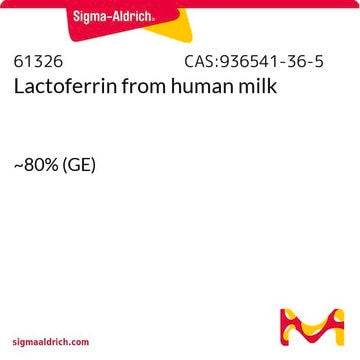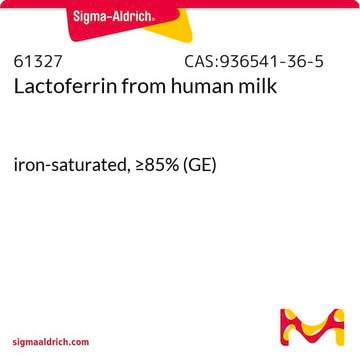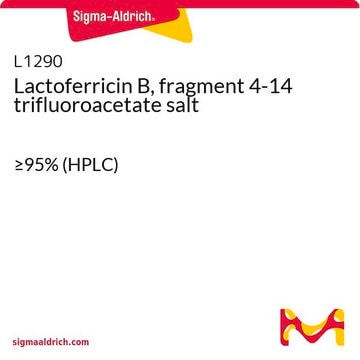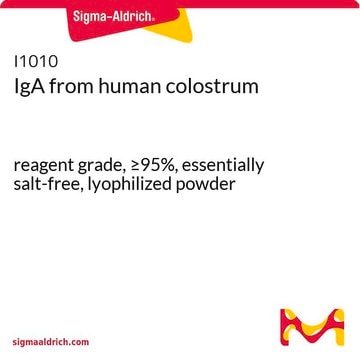L0520
Lactoferrin from human milk
≥85% (SDS-PAGE), lyophilized powder
Synonym(s):
Growth-inhibiting protein 12, Lactotransferrin, Talalactoferrin
About This Item
Recommended Products
biological source
human milk
Quality Level
Assay
≥85% (SDS-PAGE)
form
lyophilized powder
mol wt
82.4 kDa
composition
Protein, ≥90% biuret
technique(s)
microbiological culture: suitable
solubility
phosphate buffer: 1 mg/mL, clear to slightly hazy (0.01 M phosphate buffer, 0.0027 M potassium chloride and 0.137 M sodium chloride, pH 7.4, at 25 °C)
UniProt accession no.
storage temp.
2-8°C
Looking for similar products? Visit Product Comparison Guide
1 of 4
This Item | L4894 | L3770 | 61326 |
|---|---|---|---|
| biological source human milk | biological source - | biological source human milk | biological source human milk |
| technique(s) microbiological culture: suitable | technique(s) cell culture | mammalian: suitable | technique(s) microbiological culture: suitable | technique(s) - |
| form lyophilized powder | form powder | form powder | form solid |
| mol wt 82.4 kDa | mol wt 82.4 kDa | mol wt 82.4 kDa | mol wt 82.4 kDa |
| storage temp. 2-8°C | storage temp. 2-8°C | storage temp. 2-8°C | storage temp. 2-8°C |
Application
Biochem/physiol Actions
Quality
Preparation Note
Storage Class Code
11 - Combustible Solids
WGK
WGK 3
Flash Point(F)
Not applicable
Flash Point(C)
Not applicable
Certificates of Analysis (COA)
Search for Certificates of Analysis (COA) by entering the products Lot/Batch Number. Lot and Batch Numbers can be found on a product’s label following the words ‘Lot’ or ‘Batch’.
Need A Sample COA?
This is a sample Certificate of Analysis (COA) and may not represent a recently manufactured lot of this specific product.
Already Own This Product?
Find documentation for the products that you have recently purchased in the Document Library.
Customers Also Viewed
Our team of scientists has experience in all areas of research including Life Science, Material Science, Chemical Synthesis, Chromatography, Analytical and many others.
Contact Technical Service
















